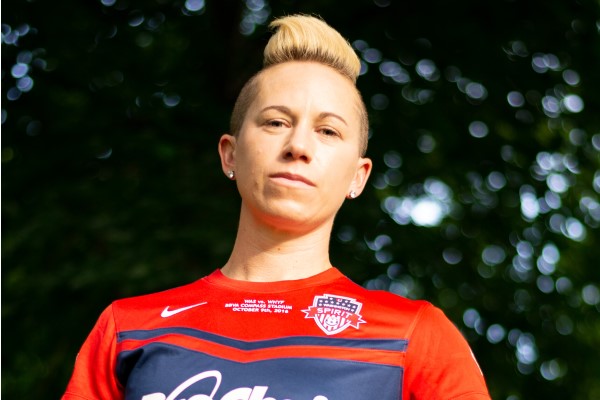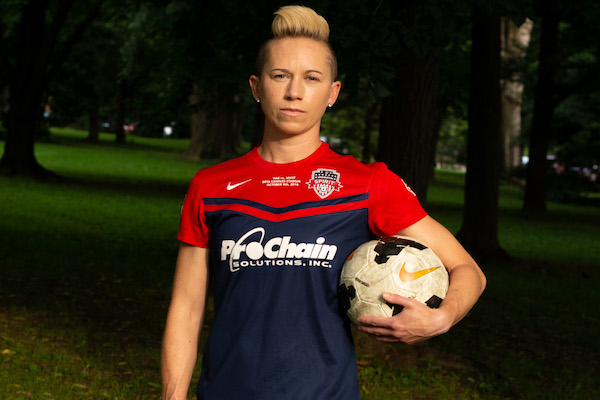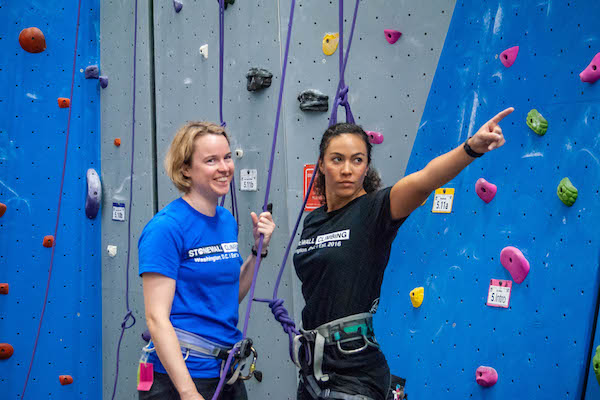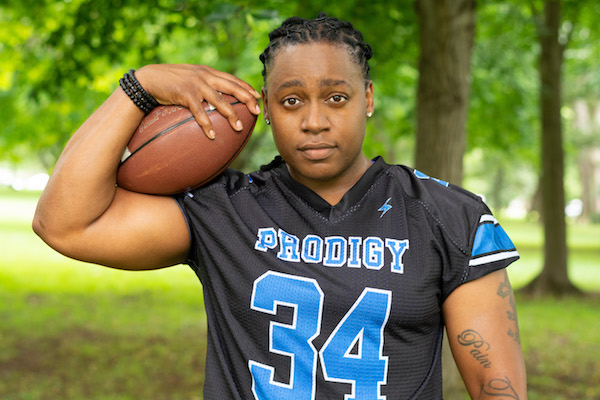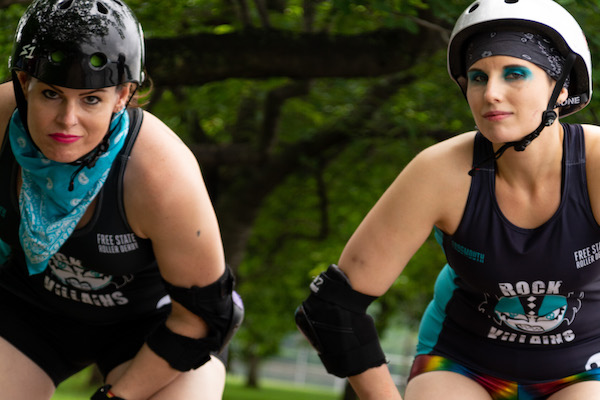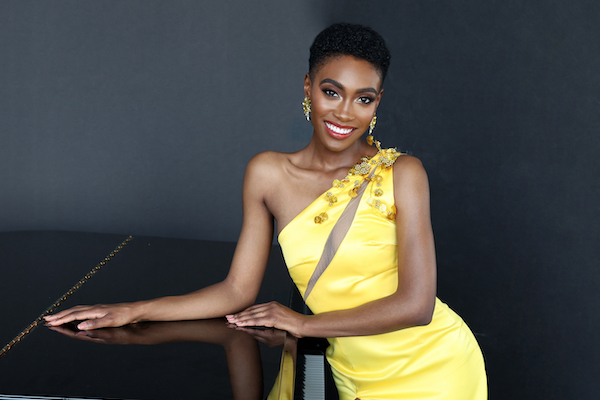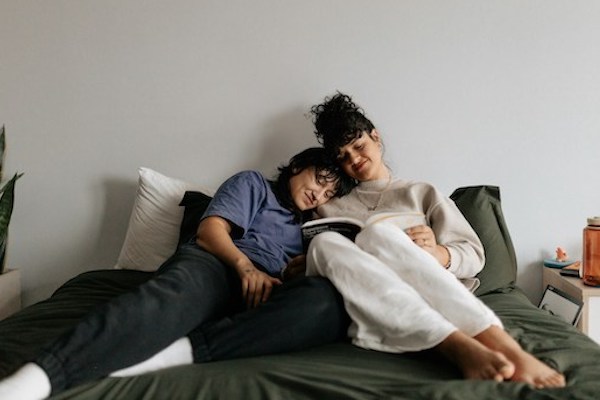
A League of Her Own for D.C. Queer Women
July 13, 2018
Women You Should Meet (W.Y.S.M.): Sara Soldner
July 16, 2018Fierce women going the distance
In the sports world being openly gay is not always welcome. While things are changing, visibility of LGBTQ athletes is still a global issue.
However, in the D.C. area the summer sports scene is heating up with LGBTQ talent and strength.
Lesbian and queer women athletes are taking their love for sports and recreation to the next level.
From soccer to roller derby, D.C. has some fierce women killing the game. You won’t find any of these women on the sideline.
Don’t believe us? Well, check out who’s on deck.
Feature photography by Robin Flemming and Alesha Randolph
JOANNA LOHMAN
Washington Spirit
Joanna Lohman is more than just a soccer player, but you’d hardly know it from her impressive record. In almost 15 years of professional sports, she has played for the Washington Freedom, the Philadelphia Independence, and the Boston Breakers. Internationally, she’s been seen playing for Espanyol in Spain’s La Liga Feminina, Balinge in Sweden’s Damallsvenskan, and Beleza in Japan’s L. League. She currently plays for the Washington Spirit in the National Women’s Soccer League.
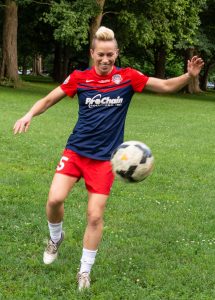 Despite this, you’re just as likely to see Lohman on a stage as on the field. She is a public speaker for many organizations and serves as a Sport Diplomat. Traveling the world, she visits developing nations and promotes gender equality, conflict resolution, cultural understanding, and economic development using sports. She says, “By establishing a team sport in an area where there are few opportunities for young women, you take an isolated individual and put her in a group of her peers.” Lohman uses the power of sport to teach life-long lessons such as leadership, focus, teamwork, resilience, passion, and time management.
Despite this, you’re just as likely to see Lohman on a stage as on the field. She is a public speaker for many organizations and serves as a Sport Diplomat. Traveling the world, she visits developing nations and promotes gender equality, conflict resolution, cultural understanding, and economic development using sports. She says, “By establishing a team sport in an area where there are few opportunities for young women, you take an isolated individual and put her in a group of her peers.” Lohman uses the power of sport to teach life-long lessons such as leadership, focus, teamwork, resilience, passion, and time management.
As a professional athlete, Lohman has been able to use her platform to advocate for equality. Her platform lets her promote deep-rooted acceptance for those around her, and she passionately believes that sport can help people “find their cool” by living an unabashedly authentic life.
There are many organizations that promote LGBTQ people in sports, including Out For the Win, You Can Play, Women’s Sports Foundation, the Human Rights Campaign, and others. Much of their work is centered around the United States, which has taken great strides in its growing acceptance of LGBTQ women in the athletic world.
However, there is still much work to be done. Lohman notes that there are no male professional athletes in a team sport who are out, so there is still work to be done to reduce negative stigmas. Her dream is for athletes to feel comfortable enough to live openly, and that they are welcomed by their fans and teammates. “Sport has the power to change the world, and I want to be a part of this positive change,” Lohman says. “I want to be a voice for so many who are forced into silence.”
ILONA JOHNSON and TATER
Stonewall Climbing
Stonewall Climbing, a LGBTQ sports organization based in the Washington, D.C. area, has solidified its reputation as a place for competitive climbing, community building, and inclusivity.
The organization “has changed a lot” since its beginning, according to member Tater, who also held a previous leadership role in the organization. Considering feedback and personal experiences, the organization has created more accessible events outside of their competitive team format.
“Despite how welcoming the climbing community is, there’s still this gap,” says Tater. “There’s still a difference on what is a safe space to different parts of the community.” Capitalizing on that, the organization has used their welcoming nature to ensure every participant feels safe in their events.
With that in mind, Stonewall Climbing has expanded into partnering with other local climbing groups, like Brown Girls Climb, emphasizing their focus on inclusion and building safe spaces for all, rather than just for some of the community.
Tater and fellow member Ilona Johnson both view Stonewall Climbing as an organization that captures the best of both worlds, functioning as an athletic and social space for the LGBTQ community. Johnson was also inspired to create a queer women’s adventure club in addition to continuing to participate in Stonewall.
The most visible queer spaces often revolve around the bar scene, making Stonewall Climbing’s investment in multifaceted programming even more important. From their competitive league to being a resource for other local athletic organizations to casual beginner hikes, the organization has grown substantially to create spaces for all members of the queer community.
“Before now, most of my friends were straight,” says Johnson. “I was craving a little more queer community, and I found that [in Stonewall Climbing].”
TIFFANY MATTHEWS
Washington Prodigy
Tiffany Matthews’ journey to becoming D.C.’s most passionate advocate of women’s tackle football began on one particularly fateful day in 2004. Following a game of flag football, the recruiter for a local women’s tackle football team approached Matthews and asked if she’d be interested in trying out. Elated at the idea of playing the sport she’d always loved at a new level, Matthews traveled directly from her game to the try-out location, where she crushed her tryouts and joined the team.
It’s been 15 years since that day. Matthews now owns the Washington Prodigy. Now in their sixth season, Matthews began the team in 2012 with team manager Jordyn White. Intent on creating a foundation around values they felt needed amplification in women’s tackle football, Washington Prodigy focuses on training and helping new players learn the game. In fact, the team’s opening roster boasted 17 players, only five of whom were veteran football players.
As Matthews prepares to lead her team into their second Championship competition, her dedication for sharing her passion for the game continues. Not only has she recently pivoted roles from player to coach, but Matthews also provides training to new players on other teams. For Matthews, the focus on working together as women and spreading love for the sport doesn’t allow room for drama on the field. This mindset helps Washington Prodigy prosper. “We have each other’s backs,” Matthews explains while referring to her teammates as family. “We all sit at the table and eat. No one gets left behind!”
Considering all she’s gained since she starting playing, Matthews has a message for other women interested in the sport. “Try it. Don’t let fear get in your way,” she asserts. “This is more than football. It’s an addition to your life.”
JUDI CLARY and FARA TAPSCOTT
Free State Roller Derby
In Washington, D.C., roller derby is one sport where queer women can join and not only learn a new game, but also find a welcoming community.
33-year-old Physician Assistant Judi Clary and 43 year-old IT Systems Engineer Fara Tapscott both discovered Free State Roller Derby at Capital Pride. Clary, known as Katty Wompin on the derby track, first saw the sport on television in the ’90s. She already loved skating but was drawn to this group of women confidently playing a contact sport, something you don’t often see. “As someone who already felt different, this struck a chord with me,” she says.
According to Tapscott, whose derby name is Feral Crow, it is “one of the only women first sports I’ve seen.” It is body positive and Free State provides safe spaces where players thrive at all skill levels. “When one thinks about the sport, the first thing that comes to mind is the women’s team,” says Tapscott. “The women I met that played it were fierce, proud, and very vocal about how amazing the roller derby community is. I wanted to be a part of that.”
Clary hopes that as more people become interested in derby, they will serve as role models for anyone struggling with self-acceptance or coming out. “Others can see that they are not alone, we are out there, and can lend support,” she says. “With the interest in roller derby increasing, my hope is that it will again become a popular sport, one that actually has gay, queer, bi, and transgender representation. This could pave the way for other sports.”


